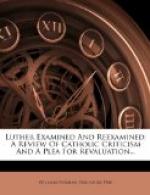It is about ten years ago since the Jesuit Grisar began to publish his Life of Luther, twice that time, since Denifle painted his caricature of Luther. Several generations ago Janssen, in his History of the German Nation, gave the Catholic interpretation of Luther and the Reformation. Going back still further, we come to the Jesuit Maimbourg, to Witzel, and in Luther’s own time to Cochlaeus and Oldecop, all of whom strove to convince the world that Luther was a moral degenerate and a reprobate. The book of Mgr. O’Hare, which has made its appearance on the eve of the Four-hundredth Anniversary of Luther’s Theses, is merely another eruption from the same mud volcano that became active in Luther’s lifetime. It is the old dirt that has come forth. Rome must periodically relieve itself in this manner, or burst. Rome hated the living Luther, and cannot forget him since he is dead. It hates him still. Its hatred is become full-grown, robust, vigorous with the advancing years. When Rome speaks its mind about Luther, it cannot but speak in terms of malignant scorn. If Luther could read Mgr. O’Hare’s book, he would say: “Wes das Herz voll ist, des gehet der Mund ueber.” (Matt. 12, 34: “Out of the abundance of the heart the mouth speaketh.”)
Luther has done one thing which Rome will never pardon: he dared to attack the supreme authority of the Pope. He made men see the ignominious bondage in which cunning priests had ensnared them, and by restoring them to the liberty with which Christ had made them free Luther caused the papacy an irreparable loss. The papal system of teaching and government was so thoroughly exposed by Luther, and has since been so completely disavowed by a great part of professing Christians that Rome cannot practise its old frauds any longer. Men have become extremely wary of Rome. That is what hurts. The Catholic writer to whom we referred sums up the situation thus: Since Luther “all Protestant mankind descending by ordinary generation have come into the world with a mentality biased, perverted, and prejudiced.” That is Rome’s way of looking at the matter. The truth is: the world is forewarned, hence forearmed against the pleas of Rome. It pays only an indifferent attention to vilifications of Luther that come from that quarter, because it expects no encomiums and only scant justice for Luther from Rome. But it is the business of the teachers of Protestant principles in religion, particularly of the church historians of Protestantism, to take notice of the campaign of slander that is launched against Luther by Catholic writers at convenient intervals. It is not a task to delight the soul, rather to try the patience, of Christians. For in the study of the causes for these calumnies against a great man of history, and of the possible means for their removal, one is forced invariably to the conclusion that there is but one cause, and that is hatred. What can poor mortal man do to break down such a cause? It does not yield to logic and historical facts, because it is in its very nature unreasoning and unreasonable.




